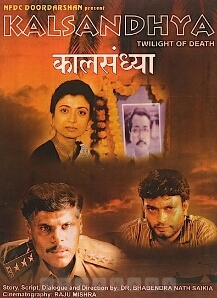| Kaal Sandhya | |
|---|---|
 Poster of the film | |
| Directed by | Bhabendra Nath Saikia |
| Written by | Bhabendra Nath Saikia |
| Starring |
|
| Cinematography | Raju Misra |
| Edited by | Ujjal Nandi |
| Music by | Gautam Mukherjee |
Release date |
|
Running time | 124 minutes |
| Country | India |
| Language | Hindi |
Kaal Sandhya is a 1997 [1] Indian Hindi crime drama film dwelling on militancy in Assam, directed by Bhabendra Nath Saikia. [2] The film deals with the theme of the impact of the insurgency on common people. [3] It stars Jatin Bora, Ashish Vidyarthi, Debashree Roy, Nipon Goswami, Pranjal Saikia, Hemen Barman, Munin Barua and Mridula Baruah in the lead roles. [4]
Contents
The film was screened at the International Film Festival of India in New Delhi that year and also as part of the Indian section at the Cairo International Film festival. [5]